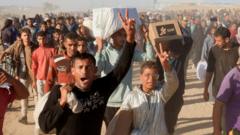Over 130 charities, including influential organizations like Oxfam and Amnesty International, are urging the termination of the Gaza Humanitarian Foundation (GHF) following alarming reports of violence against Palestinians seeking aid, which has resulted in over 500 deaths and thousands of injuries.
130 Charities Demand Closure of Controversial Gaza Aid Foundation

130 Charities Demand Closure of Controversial Gaza Aid Foundation
Major NGOs call for the shutdown of the US-Israeli backed Gaza Humanitarian Foundation amid rising violence against aid seekers.
More than 130 charitable organizations and non-governmental organizations (NGOs) are demanding the closure of the Gaza Humanitarian Foundation (GHF), which has come under fierce criticism for its operations in the region. This call to action arises after the foundation, supported by Israel and the United States, began its operations in late May amidst an ongoing blockade, during which over 500 Palestinians have reportedly been killed while trying to access aid. Approximately 4,000 individuals have also sustained injuries in these circumstances.
The coalition of groups, which includes prominent entities like Oxfam, Save the Children, and Amnesty International, accuses GHF of violating essential humanitarian principles. They contend that Israeli forces and armed groups frequently open fire on Palestinians who attempt to receive aid, with the organizations emphasizing the dire conditions faced by two million Gazans confined to crowded, militarized zones where daily gunfire is a threat.
Since the GHF began its work, reports from various sources—including eyewitness accounts, medical personnel, and the health ministry in Gaza—indicate that civilians seeking aid at distribution centers are increasingly at risk of violence. In stark contrast to the previous system, which featured over 400 aid distribution points during a temporary ceasefire, the GHF has replaced these with just four military-controlled sites, located primarily in the south and one in central Gaza.
A joint statement from the NGOs starkly highlights the dilemma for many families in Gaza: “Today, Palestinians in Gaza face an impossible choice: starve or risk being shot while trying desperately to reach food to feed their families.” The situation has led to tragic circumstances, with reports indicating that children and caregivers have been among the casualties in various attacks at these locations.
The aid distribution strategy has faced heavy condemnation from UN officials, with Secretary-General António Guterres describing the GHF system as "inherently unsafe." The United Nations has long criticized the approach, cautioning that it could "militarize" humanitarian aid and obligate the Gazan population to traverse perilous areas for food.
Reports from Israeli media have even suggested that IDF soldiers received orders to potentially target unarmed civilians near aid distribution sites to disperse crowds. Israeli Prime Minister Benjamin Netanyahu has categorically dismissed these allegations as "malicious falsehoods." The IDF has stated that it is working to enhance safety at the sites by introducing new fencing and signage.
Nonetheless, the 130 NGOs argue that the GHF's approach is "not a humanitarian response." They emphasize the severe hunger and famine-like conditions resonating within Gaza, as many families report being too frail to contend for food rations. As violence, disorder, and casualties continue to escalate, calls for a reevaluation of the aid dispatch system grow louder.




















